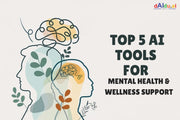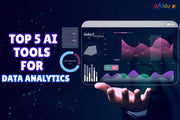Healthcare in 2025 is being transformed by AI, from diagnosis to mental wellness. Intelligent platforms now assist doctors, automate clinical notes, and enable personalized therapy. The future of health management is faster, more accurate, and deeply human centered through AI.
What is AI in Healthcare?
AI in healthcare uses intelligent algorithms to analyze data, automate tasks, and enhance decision making for clinicians and patients alike. From symptom detection to personalized care recommendations, these systems learn continuously, improving accuracy with every interaction. Today, AI is at the heart of modern healthcare, helping doctors save time, patients access care faster, and systems operate more efficiently.
Why Healthcare Needs AI Now
Hospitals, clinics, and wellness providers manage thousands of records, appointments, and diagnostics daily. Manual processes increase cost and delay treatment. AI eliminates inefficiency by automating workflows, tracking patterns, and providing real time insights for better outcomes. AI supports healthcare teams by streamlining patient documentation and scheduling, reducing errors in diagnosis and reporting, predicting health risks and alerting care teams early, and powering virtual consultations and wellness tracking. In the UAE, where healthcare digitalization and telemedicine adoption are accelerating, AI ensures compliance, efficiency, and patient satisfaction across all medical sectors.
How AI Transforms Healthcare Operations
AI integrates with hospital management and EHR systems to remove repetitive manual tasks. Doctors now use AI to transcribe notes, analyze medical data, and communicate with patients through smart assistants. With AI, healthcare professionals can automate documentation and note taking during consultations, detect anomalies or risk factors early using predictive analytics, conduct accurate teleconsultations without losing human connection, and deliver personalized care plans and mental health support instantly. The result is less paperwork, faster treatment, and smarter care decisions.
5 AI Tools for Healthcare & Wellness to Try in 2025
Here are the five tools transforming healthcare delivery, patient care, and mental wellness, particularly relevant for the UAE and GCC markets.
Infi Heal
Best for Personalized AI for Emotional Well-being

Infi Heal is a conversational AI platform built to support mental health and daily emotional balance. It uses behavioral AI to track stress, emotions, and mental patterns, delivering mindfulness guidance and self-reflection exercises. The app adapts daily recommendations to help users relax, reflect, and achieve emotional stability. Use Cases include AI-driven mood and emotion tracking, guided journaling for mental clarity, personalized mindfulness and self-care sessions, and daily mental wellness insights.
Pricing: Freemium model with premium subscription for advanced analytics
| Pros | Cons |
|---|---|
| ✔ Real-time adaptive emotional guidance ✔ Supports stress reduction and positivity ✔ Accessible 24/7 on mobile and web |
✖ Lacks live therapist integration ✖ Internet connection required |
Upheal
Best for Smarter Therapy with AI Documentation

Upheal is an AI assistant designed for therapists, automating documentation, transcription, and emotional analysis. It records and summarizes therapy sessions into structured notes, saving hours of admin time. Built with HIPAA compliance, it ensures secure client management while enhancing therapy quality. Use Cases include transcribing and summarizing therapy sessions, analyzing emotional tone and progress trends, generating clinical notes automatically, and simplifying client data management.
Pricing: Subscription-based with tiered plans for individuals and clinics
| Pros | Cons |
|---|---|
| ✔ Saves time with automated progress notes ✔ High accuracy with emotion detection ✔ HIPAA-compliant and privacy-focused |
✖ Requires setup with practice software ✖ Some features limited to pro plan |
Zaia Health AI
Best for UAE Homegrown Healthcare Automation

Zaia Health AI is a UAE based platform built to automate patient management and clinical workflows. It leverages predictive analytics to identify at risk patients, optimize scheduling, and streamline communication across teams. Developed for the GCC healthcare ecosystem, Zaia ensures local compliance and operational excellence. Use Cases include predicting patient risk and health trends, automating follow ups and reminders, enhancing doctor and patient communication, and optimizing clinic operations and reporting.
Pricing: Custom enterprise pricing based on hospital or clinic scale
| Pros | Cons |
|---|---|
| ✔ Built for UAE healthcare standards ✔ AI-driven operational insights ✔ Improves efficiency and patient satisfaction |
✖ Requires integration with existing EMR/EHR systems ✖ Enterprise-level setup recommended |
Doctorina
Best for Intelligent Virtual Consultations

Doctorina is an AI powered telemedicine platform designed for real time consultations and smart triage. It performs symptom analysis, diagnosis support, and connects patients with the right specialists instantly. Fully aligned with UAE DHA and DOH regulations, Doctorina enables secure, fast, and compliant healthcare delivery. Use Cases include smart symptom checking and triage, real time video consultations, virtual health records and prescriptions, and 24/7 telemedicine for patients.
Pricing: Flexible pricing for clinics and hospitals
| Pros | Cons |
|---|---|
| ✔ Reduces patient wait time ✔ Accurate AI-assisted diagnosis ✔ Compliant with UAE telehealth policies |
✖ Requires internet stability for video calls ✖ Some advanced analytics under enterprise plan |
Autonotes AI
Best for Medical Voice-to-Note Documentation

Autonotes AI revolutionizes medical documentation by automatically converting speech into structured clinical notes. It captures patient conversations in real time, ensuring accuracy and EHR compatibility. By eliminating manual typing, doctors can focus on what matters most, quality patient care. Use Cases include voice to text clinical documentation, real time note creation during consultations, integration with hospital EHR systems, and medical record accuracy tracking.
Pricing: Subscription-based, with enterprise customization for hospitals
| Pros | Cons |
|---|---|
| ✔ Saves hours of manual documentation ✔ Improves consistency and compliance ✔ HIPAA-secure and cloud-based |
✖ Requires clear speech for accuracy ✖ Advanced analytics available in higher plans |
Final Takeaway
AI is redefining healthcare in 2025, bridging human empathy with digital intelligence. Infi Heal, Upheal, Zaia Health AI, Doctorina, and Autonotes AI lead this transformation, helping professionals deliver care that is faster, smarter, and more compassionate. The future of wellness lies in synergy, AI handles the data, doctors handle the healing.
Frequently Asked Questions
Find quick answers to common questions about these AI healthcare assistants.
Q1. What are the best AI tools for healthcare in 2025?
Q2. How does AI improve healthcare operations?
Q3. Are these tools suitable for UAE hospitals?
Q4. What is the main benefit of AI in healthcare?
Q5. Where can I find these tools?







